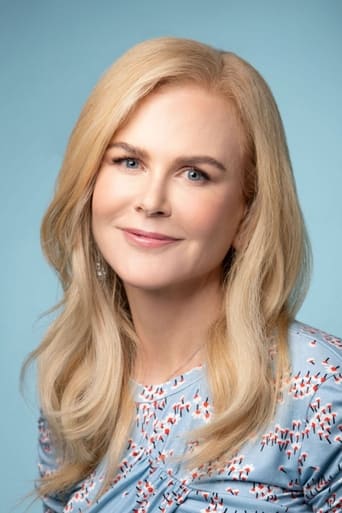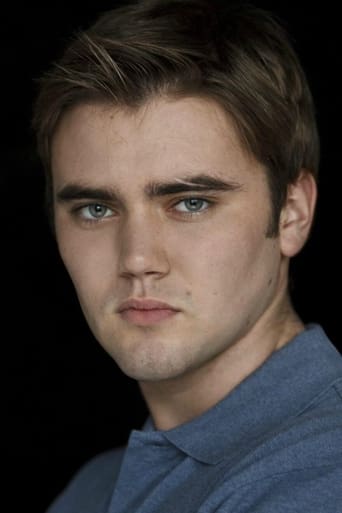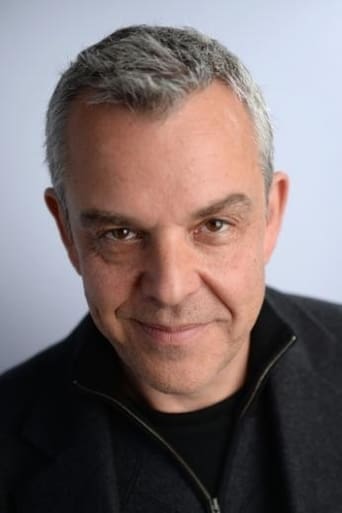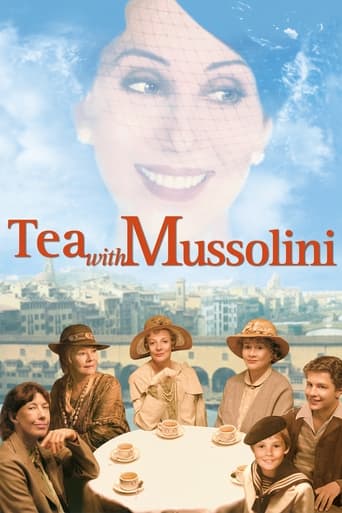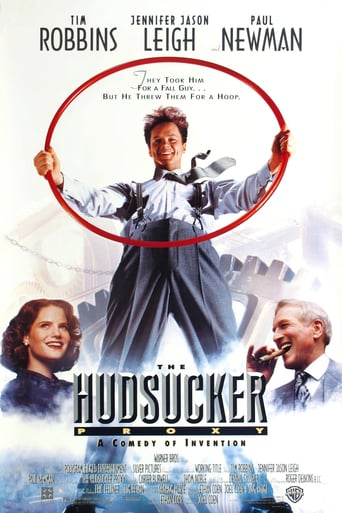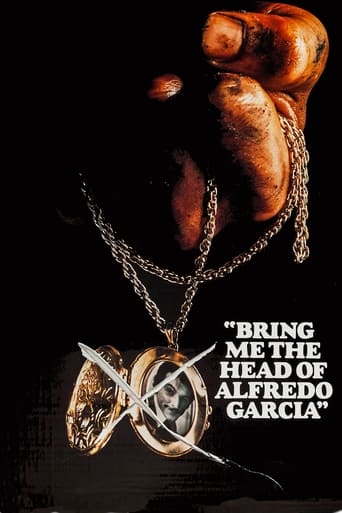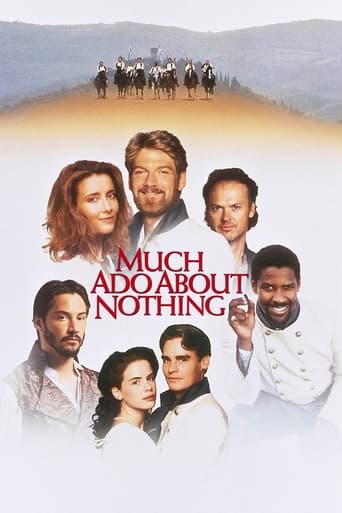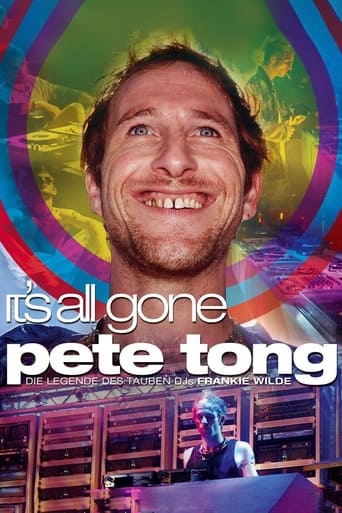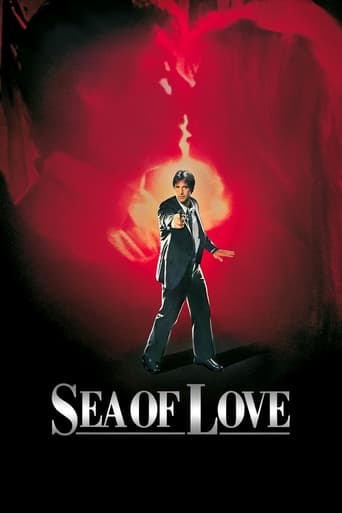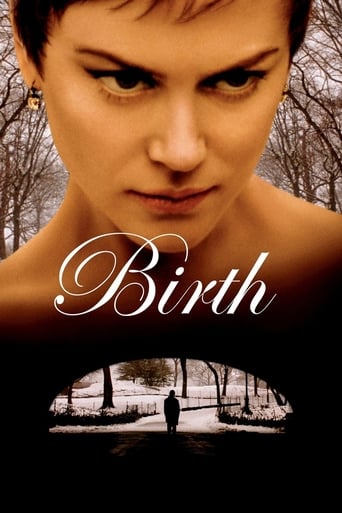
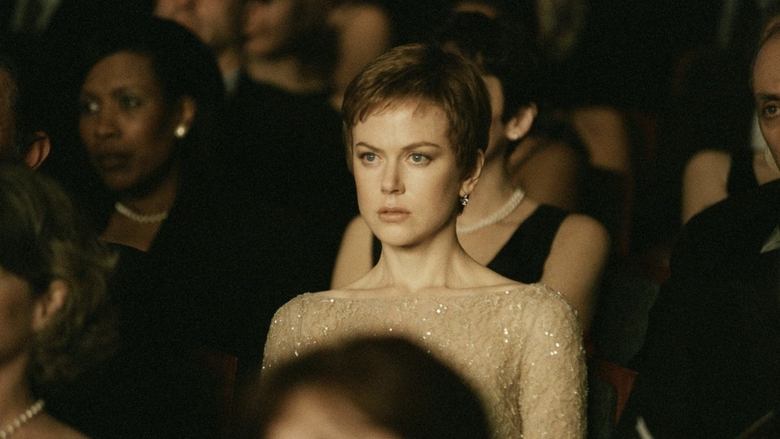
Birth (2004)
It took Anna 10 years to recover from the death of her husband, Sean, but now she's on the verge of marrying her boyfriend, Joseph, and finally moving on. However, on the night of her engagement party, a young boy named Sean turns up, saying he is her dead husband reincarnated. At first she ignores the child, but his knowledge of her former husband's life is uncanny, leading her to believe that he might be telling the truth.
Watch Trailer
Cast
Similar titles
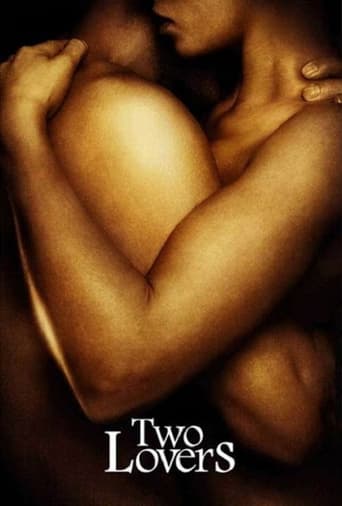

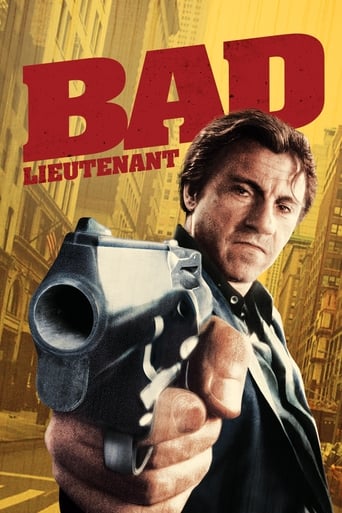
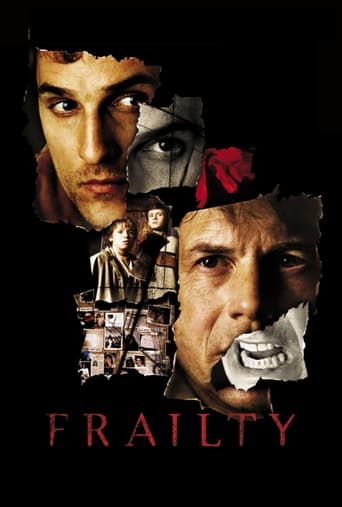
Reviews
Best movie of this year hands down!
Good story, Not enough for a whole film
Best movie ever!
Good films always raise compelling questions, whether the format is fiction or documentary fact.
This is my first time writing a review. Normally, if I am moved to say something about a film that I saw, I would settle for writing in the message boards. "Birth", however, is so horribly underrated that I find myself compelled to at least try and redeem it. I have watched "Birth" so many times that I've lost count. It is a very cunning film (in a good way!), with many symbols and layers that keep revealing themselves the more you watch it. It is superbly written, acted, directed and edited. But most of all it is a very sad story about a young and fragile woman who is first hurt, and almost destroyed (my presumption), by the death of a much loved spouse, only to be wounded again ten years later by the surfacing of the truth about her admired dead husband.When I saw the film for the first time I was so consumed by the question of whether or not the boy is a reincarnation of Anna's husband (finding myself both wishing that he was and that he wasn't), that I completely forgot the first time that Sean the boy appears, and that there was some very peculiar behavior of Claire's, and also a package that she buries in the park. As I wrote above, I have since watched the film many many more times. It is always painful to watch Anna spiral out of control after finally, and barely, managing to get her life back on track. Since Sean the boy is nothing like Sean the adult, it is clear that the second love affair is happening entirely inside Anna's head, which is most obvious in the scene where she kisses Sean the boy while her eyes (and, of course, her mind's eyes) are seeing something entirely different. Which, of course, says a lot about love in general, how much we really see or know, how much is our own invention etc. The first times that I've watched the film I've managed to overlook the too obvious blowing of the final candle on the cake by Anna... A recurring element in the film is the word "lie": Laura saying, "from now on we tell the truth - no more lying", and near the end Anna shaking Sean in the bath saying "so you're a little liar, aren't you?!", which stand out after watching the film several times, because it is actually Sean the adult who was the liar. I can't deny that there are holes in the script that I can't fill. Forgive me, but those who think this film is about reincarnation are fools. The film cunningly uses our natural wish to see our dead loved ones again so that the end of the film and the explanation of young Sean's knowledge will come as a bitter blow to us, just as it comes to Anna. And here is the most important yet very slippery moment in the entire film: At Anna's wedding she is taken aside to be photographed on her own, and as she holds her bouquet and tries to smile to the camera a thoughtful expression settles on her face... She doesn't hear the photographer anymore, as understanding finally dawns on her... In the scene where little Sean tells Anna that he is "not Sean, because he loves her" she doesn't understand... understanding comes at that specific moment at the wedding, and it is this intuitive grasping of the truth about her beloved Sean that drives her to try or at least wish to drown herself in the sea. I tried to share my enthusiasm of the film with people who are close to me and, well, "failed". Either they did not see so much in the film as I did, or the pivotal moment at the wedding remained something that only I felt/saw. There is nothing at all in the script or the events in the film that can justify my certainty of that moment's meaning, but I have yet to change my mind about it... And finally, something perhaps not so important but which bothered my for a while until (I think...) I figured it out: In the scene between Claire and young Sean in her apartment, Claire has smooth blond hair that looks completely natural. However, when the scene cuts into the chase into the lobby of Claire's building, her hair looks like a reddish wig. It took me a while to come to the (unsubstantiated, of course) conclusion that this scene was added after the filming was done. It is my guess that either the director himself or his producers thought that there wasn't enough information to make the film understood, and so they added Claire's explanation of how Anna's letters got to her and why. "Birth" is definitely one of my favorite films, and remains a painful pleasure in its perfect imperfection every time I watch it again.
I remember when it was released in 2004, there was a big hurrah about "the" bath scene, many vitriolic complaints about how slow it was, how not scary it was et al. Birth is many wonderful film making things, of course not all of those things will resonate or enthral many of the movie watching populace, yet there is such craft on both sides of the camera here, and an atmospherically ambiguous bloodline pulsing throughout, that marks it out as a particularly striking film.Plot finds Nicole Kidman as Anna, who is about to be re-married but finds her world tipped upside down when a young boy (Cameron Bright) arrives on the scene and announces he is the reincarnation of her dead first husband...Director Jonathan Glazer and his co-writers Jean-Claude Carrière & Milo Addica are purposely being vague, I mean lets face it, the topic to hand is exactly that, vague, and ripe for countless hours of discussion. The film simmers along deftly, meditations on love, grief and anger are skilfully portrayed by all involved. Even a birthing tunnel metaphor doesn't come off as self indulgent, from the off Glazer wants and gets those interested in the story to buy into the hypnotic qualities on show. To jump on board with Anna's fragility while all around her battle for rhyme or reason with her mindset.In truth it's a hard sell as a piece of entertainment, there's still today, over a decade since it was released, people miffed that the hinted at supernatural elements are not key to the narrative. While the thin line of good and bad taste - and maybe even pretentiousness - is being tested by the makers, but the charges of Birth being dull are just wrong. It never shows its hand, the mystery always remains strong, while Kidman and Lauren Bacall are reason enough to admire the acting craft on show.Hated by many, inducing even anger in some quarters, Birth is a tantalising picture. A conundrum designed to get a response, for better or worse. 8/10
Having only recently watched this, I am slightly torn as to what to make of it. On one hand, the cinematography - all eerie, snowy landscapes in palate tones and classic houses, is stunning, and the acting from all of the performers is incredibly executed and "real". Another thing that stood out for me from the start of the movie was the score, which is incredibly raw, organic and haunting but manages to stay somewhat uplifting. As a film in general, however, I felt that too many things were left unanswered or unclear. The inclusion of Sean's secret lover was a brilliant touch, and as pointed out by another review, was pivotal to the end of the film as one could argue that Sean was tricking Anna into thinking he was lying throughout the film about being her husband, because he was ashamed of the way that he lived in his previous life with her. Although this seems incredibly likely, it is left very much to the viewer to make this decision themselves, as the only hint is a one liner from Sean -"Don't tell Anna" when his lover comes to see him, implying that he knows who she is. This suggests that he really is a reincarnated Sean, which on a first view you would not see, as this hidden message is simply, too hidden. Another thing that struck me was that because the acting was so real, it seemed unlikely that Anna would of fallen for the boy, simply because he shows no character traits of Sean, except for memories such as knowing where and when they slept together, etc. In fact, other than that, the only "proof" Anna would have that the boy is Sean, is the fact that he tells her "I am Sean". The film seems more a character portrait of Anna, as you watch her slowly deteriorate from a level headed, relaxed and balanced woman from a privileged background (which makes the whole situation worse, as her prim family watch in disapproval as she falls for the boy claiming to be her husband), into a slightly unstable and confused character, who seems to simply want to believe that the boy really is Sean. All in all, a good film with a decent plot, excellent cinematography and a breathtaking score, but the anti-climax style ending could be a let down to viewers if they do not take in the fact that Sean may have been so embarrassed about cheating on Anna in his past life that he convinces her he was lying throughout the film.
"Sorrow makes us all children again." - Ralph Emerson Jonathan Glazer's "Birth" stars Nicole Kidman as Anna, a woman whose husband died ten years earlier. Though still mourning her husband's passing, Anna begins a relationship with Joseph, whom she somewhat reluctantly plans to marry. Things get complicated, however, when a ten year old boy enters Anna's life. She doesn't know him, but the boy claims to be her long dead husband. Much creepiness, confusion and mystery then ensues."Birth" was written by Jean-Claude Carriere, who worked on a number of Luis Bunuel's scripts ("Belle de Jour", "The Milky Way", "The Discreet Charm of the Bourgeoisie", "The Phantom of Liberty", "That Obscure Object of Desire"). Like most of those films, "Birth" eventually becomes a meditative inquiry, the ten year old boy becoming a manifestation of Anna's grief and pre-marital anxieties. He is a weight tying her to the past, an anchor preventing her from moving on. In a very real sense, his birth prevents her rebirth.It's important to remember that Carriere often writes about issues of theology and has even interviewed the Dalai Lama several times. So look closer, and "Birth" is very much about faith, belief and even fundamentalism. In this regard, the film revolves around twin beliefs; Anna's absurd belief that the boy is her husband reborn, and the boy's belief that he can be her husband if only he ritualistically love her like a husband should. For obvious reasons, both beliefs are presented as being, not only irrational, but highly transgressive, veering into paedophilia in Anna's case and peripubescent teleiophilia in the boy's case. But both transgressions are also shown to be surmountable, the film echoing Blaise Pascal's famous advice to those who struggle with faith: when in doubt, ritualistically kneel down and pray until faith comes to you. This, of course, echoes numerous self-help mantras: "Believe until you believe", "Fake it until you make it", "Practise makes perfect" etc. What the film says, though, is that, not only is belief less dependent on the subject's critical judgement than on habit, but that belief always serves to delay the inevitable. Belief always delays realisation and defers (unattainable) satisfactions and expectations. Belief, then, is the postponement of the trauma of belief. In this regard, Anna not only feigns love in order to postpone the realisation that the boy is not her husband, but feigns love in order to delay having to feign love for a new man, the Biblically named Joseph. The film then ends with Anna on a beach, tearfully embracing her new husband. She will fake it with him until she believes it. The difference is, now she's learnt she never will. This is Antonioni/Kubrick territory ("Beyond The Clouds", "Identification of a Woman", "Eyes Wide Shut" etc): our only means of being guilty is by giving way to desire, and the only way that one can truly love another is by absolving them of the burden of believing in that love.For three quarters of its running time, "Birth" is a masterful picture. This is a type of high-brow "European psychodrama" which all but died in the 1960s. Elsewhere it resembles the moody horrors of early Polanski ("Repulsion", "The Tenant" and "Rosemary's Baby", Kidman even sporting a Mia Farrow haircut) and late Kubrick (The Shining", "Eyes Wide Shut"), with a little Hitchcock thrown in. Shot by cinematographer Harry Savides (the sublime "Elephant"), it's a gorgeous film, filled with elegant passages, enchanting moments, and spooky, stealthy camera movements.Unfortunately the film's final act is a mess, "Birth" degenerating into merely a classier version of "The Sixth Sense", topped off by a generic "beach ending" reminiscent of Truffaut's "400 Blows" and Fellini's "La Dolce Vtia". And so by the film's climax, the audience is offered one of two readings. Either there genuinely was a reincarnation, the boy halting his romantic pursuits simply because he realised that he was unfaithful to his wife in his prior life, or there was no reincarnation, the boy concocting an elaborate plot because of his infatuation with Anna. The latter reading is the more interesting, as it suggests that the boy's fantasies stem from his poverty. This again is a common Jean-Claude Carriere theme; the pauper child wants to live in Anna's world of wealth and elegance, but cannot have it because he refuses to be the bastard her husband was.Watch the film a second time, though, and neither reading enhances the film or adds nuance to what we see unfold. Instead, our newfound knowledge seems to push "Birth" toward the phony and the unsatisfying. In a way, this is thematically fitting. The con job the kid plays on Anna is akin to the con job this film plays on its audience. It's all outer appearances and outer beauty, all of which masks the fact that there's nothing present except for the longing of presence.8/10 – See Agnieszka Holland's similarly themed "Olivier, Olivier". Worth two viewing.
